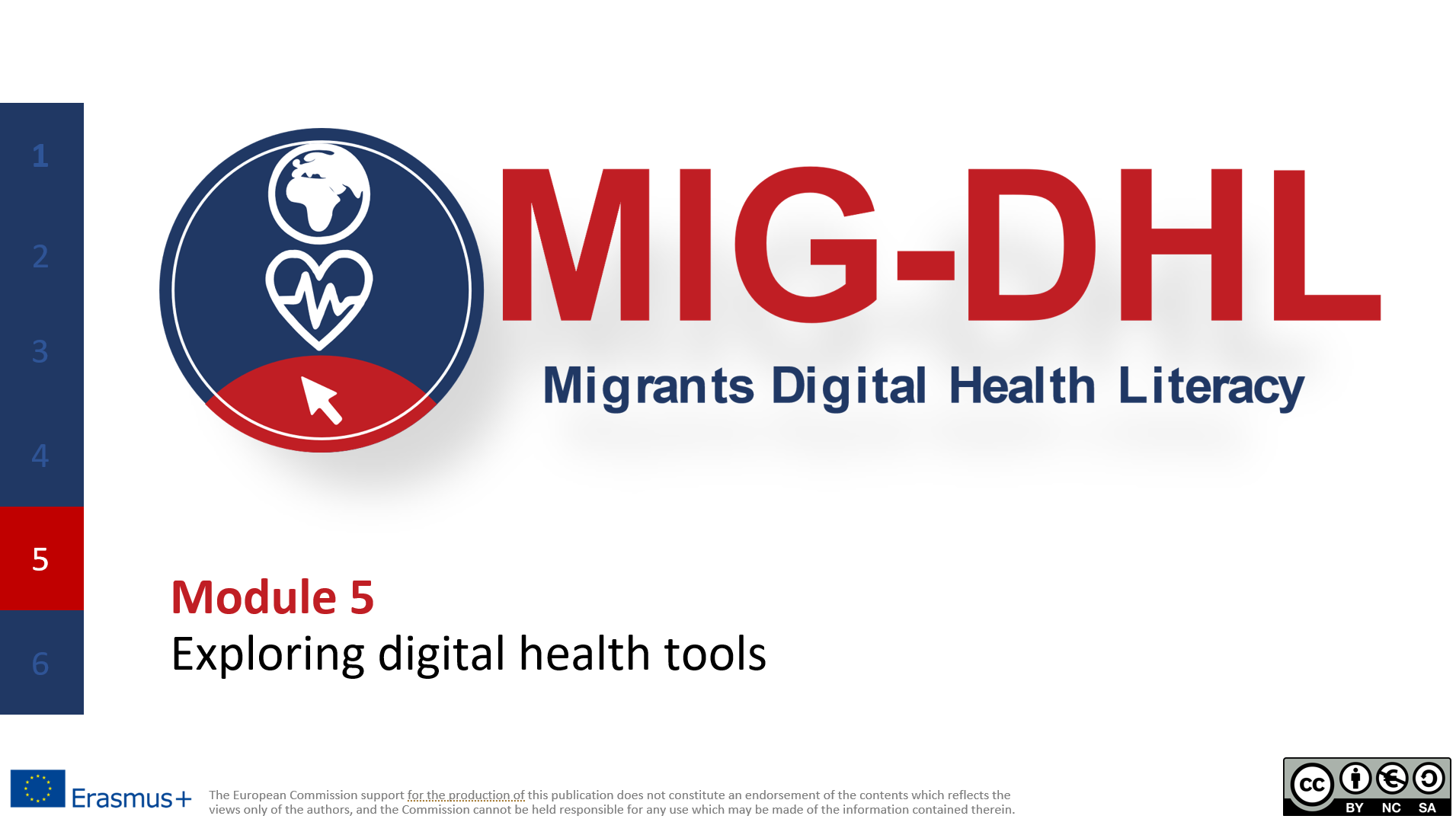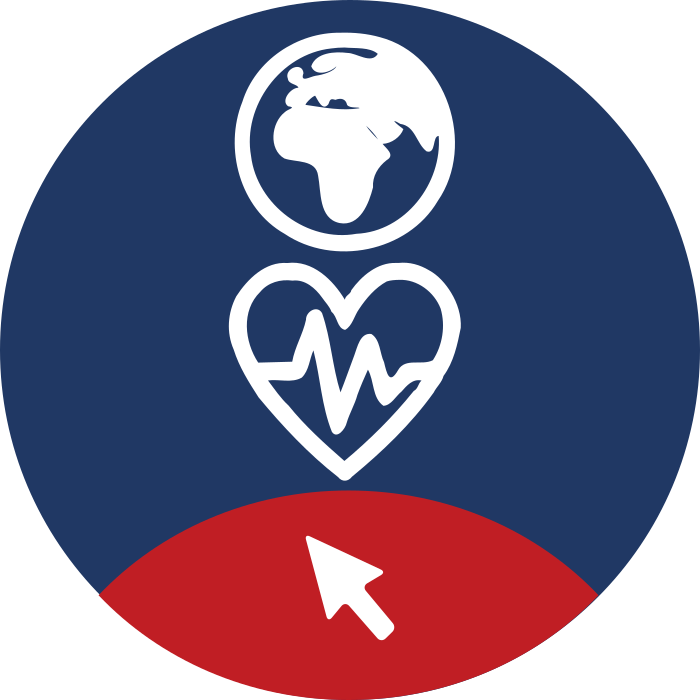Course 5 - Exploring Digital Health Tools (Course5-EN)
Training the Trainers on Module 5 - "Exploring Digital Health Tools"
Authors:
Carlos Serra, UVEG
Karin Drda-Kühn, MediaK
Objectives
✔ Understand what to expect to encounter when surfing online Identify beneficial health information online
✔ Understand the dangers of auto-cure
✔ Identify the benefits of health knowledge and how to get the best of it
✔ Identify trustworthy health information sources
Competences
✔ Search-Find: capacity of the learner to search for health-related information using the Internet
✔ Understand: capacity of the learner to comprehend and figure out health related information found online and derive meaning.
✔ Appraise: capacity of the learner to be able to critically review and assess the relevance and trustworthiness of health-related information on different online sources.
Materials
- Handbook for the trainer (PDF) - For preparing a face 2 face training session. Explains the slides.
- Slides of Module 5 for the trainer (PDF, PPT) - To be used by a trainer in face 2 face training session.
- Online Training Module 5 for the trainee (LINK) - To be used by a trainee in the online training session.
- Guidelines for all Designed Practical Training Activities (DPTAs) for the trainer (PDF) - For preparing the Practical Activities in a face 2 face training session.
The European Commission support for the production of this publication does not constitute an endorsement of the contents which reflects the views only of the authors, and the Commission cannot be held responsible for any use which may be made of the information contained therein. Project number: 2020-1-DE02-KA204-007679.
LessTraining the Trainers on Module 5 - "Exploring Digital Health Tools"
Authors:
Carlos Serra, UVEG
Karin Drda-Kühn, MediaK
Objectives
✔ Understand what to expect to encounter when surfing online Identify beneficial health information online
✔ Understand the dangers of auto-cure
✔ Identify the benefits of health knowledge and how to get the best of it
✔ Identify trustworthy health information sources
Competences
✔ Search-Find: capacity of the learner to search for health-related information using the Internet
✔ Understand: capacity of the learner to comprehend and figure out health related information found online and derive meaning.
✔ Appraise: capacity of the learner to be able to critically review and assess the relevance and trustworthiness of health-related information on different online sources.
Materials
Training the Trainers on Module 5 - "Exploring Digital Health Tools"
Authors:
Carlos Serra, UVEG
Karin Drda-Kühn, MediaK
Objectives
✔ Understand what to expect to encounter when surfing online Identify beneficial health information online
✔ Understand the dangers of auto-cure
✔ Identify the benefits of health knowledge and how to get the best of it
✔ Identify trustworthy health information sources
Competences
✔ Search-Find: capacity of the learner to search for health-related information using the Internet
✔ Understand: capacity of the learner to comprehend and figure out health related information found online and derive meaning.
✔ Appraise: capacity of the learner to be able to critically review and assess the relevance and trustworthiness of health-related information on different online sources.
Materials
Course Description

Objectives
-
Building on the dimensions of digital health literacy (1- Operational skills; 2- Navigation skills; 3- Information searching; 4- Evaluating reliability; 5- Determining relevance; 6- Adding content; 7- protecting privacy) this DPTA will address, specifically and in a practical manner, dimensions 2 to 5, and DPTA_6 will address dimensions 6 and 7. In order to operationalise the work to be carried out in the framework of this DPTA, dimensions 2) to 5) of Digital Health literacy will be integrated into the sub-skills for digital health literacy identified by the H2020 IC-Health EU Project -Improving Digital Health Literacy in Europe, GA 727474-: Search, Understand and Appraise. This project also identifies the sub-skill ‘Apply’, which will be addressed in DPTA_6. Thus, these sub-skills are defined as follows:
- Search-Find: The keyword ‘find’ is used to describe the capacity of the learner to search for health-related information using the Internet. Individuals with this capacity can identify appropriate search terms and can construct search queries to find the information they are looking for. In addition, they can identify, from the information they find, the information related to their questions and find the exact information they are looking for.
- Understand: The keyword ‘understand’ is used to describe the capacity of the learner to comprehend and figure out health related information found online and derive meaning.
- Appraise: The keyword ‘appraise’ is used to describe the capacity of the learner to be able to critically review and assess the relevance and trustworthiness of health-related information on different online sources. More specifically, it refers to the abilities of the learner to differentiate high quality from low quality sources by judging the accuracy, value and relevance of online health information based on valid and established criteria. Established criteria that allow judging online health information are, for example, the websites’ authorship, the website’s goals and objectives, commercial interests, the presence of an accredited certificate and the absence of advertising.
Learning objectives
- Understand what to expect to encounter when surfing online
- Identify beneficial health information online
- Understand how to protect your health information
- Identify trustworthy health information sources
- Understand the dangers of auto-cure
- Understand how to cooperate with your doctor
- Identify the benefits of health knowledge and how to get the best of it
Participants & roles
- Migrants: About 10 (newcomer) migrants in each country as beneficiaries of the training.
- Migrant peers (about 1-2): About 1-2 migrant peers, who are key persons in the migrant communities or are already integrated in the host country. These persons are to be built up as confidants within the learning processes. They therefore have a dual role: an affirmative role ("Yes, I also had this experience when I started to deal with the health system in the country of arrival.") and an encouraging role ("It took me a while to figure everything out, but there is a lot of support."). It is very important that this role is clearly communicated in advance. Migrant peers can also offer their views on which apps and information sources are most important to them. They might even play the role of trainers in certain cases.
- Health professionals (about 1-2): The expected role of health professionals is to actively participate in the sessions (optional), based on the same argumentation as migrant peers. It is therefore advisable to invite health professionals to participate in the different sessions of this DPTA as observers and with access to the materials on the online platform in case they want to observe (and even conduct) the online tasks. They can provide special insight into the practical usefulness of the different apps and directories used in the different activities, as well as in solving the case studies.
Competences
This module includes information on how to acquire online health information, highlighting the fact that the online world can be a powerful tool to find valuable information, but it can also mislead patients, so we should be careful. The trainees will become familiar with the different information providers as well as the type of contents they can find online. They will learn how to identify the sponsor of a website, its purpose and how they can protect their personal information. This module will also provide some tips to check if the source of information is credible and up to date, as well as how to avoid the confirmation bias – “we should be open to the “strangeness” of new information that goes against our beliefs, in order to avoid the confirmation bias”. In the last part of this module, some dangers of “trying without medication” will be presented, besides some tips on how to better cooperate with the doctor by, for example, sharing the patient’s point of view, choosing a relationship style, and preparing for appointments. The module ends with the benefits of health knowledge and how to get the best of it.
Training contents
-
Practical development of knowledge and experience regarding the following digital health literacy skills: Navigation skills; Information searching; Evaluating reliability; Determining relevance.
Duration
Duration of the sessions: 9 hours.
- Face to face session: 7 hours (4 sessions of 1,40 minutes each)
- Online session: 2 hours
Transversal training
- Social skills
- Language skills
- Ability of teamwork
- Ability to weigh up the advantages and disadvantages of conventional medicine and alternative healing methods
- Skills to put in practice theoretical contents
Methodology
- Active and participative
- Face to face training:
- Dialogue
- Role playing
- Teamwork
- Online training:
- Practical implementation -through assignments- of some tips agreed in the classroom.
- Some collaborative work
Training materials
- Face to face sessions:
- PowerPoint presentations
- Word documents. Explaining the main concepts shown on PPT
- Online sessions:
- Online assignments in the training platform
-
Building on the dimensions of digital health literacy (1- Operational skills; 2- Navigation skills; 3- Information searching; 4- Evaluating reliability; 5- Determining relevance; 6- Adding content; 7- protecting privacy) this DPTA will address, specifically and in a practical manner, dimensions 2 to 5, and DPTA_6 will address dimensions 6 and 7. In order to operationalise the work to be carried out in the framework of this DPTA, dimensions 2) to 5) of Digital Health literacy will be integrated into the sub-skills for digital health literacy identified by the H2020 IC-Health EU Project -Improving Digital Health Literacy in Europe, GA 727474-: Search, Understand and Appraise. This project also identifies the sub-skill ‘Apply’, which will be addressed in DPTA_6. Thus, these sub-skills are defined as follows:
- Search-Find: The keyword ‘find’ is used to describe the capacity of the learner to search for health-related information using the Internet. Individuals with this capacity can identify appropriate search terms and can construct search queries to find the information they are looking for. In addition, they can identify, from the information they find, the information related to their questions and find the exact information they are looking for.
- Understand: The keyword ‘understand’ is used to describe the capacity of the learner to comprehend and figure out health related information found online and derive meaning.
- Appraise: The keyword ‘appraise’ is used to describe the capacity of the learner to be able to critically review and assess the relevance and trustworthiness of health-related information on different online sources. More specifically, it refers to the abilities of the learner to differentiate high quality from low quality sources by judging the accuracy, value and relevance of online health information based on valid and established criteria. Established criteria that allow judging online health information are, for example, the websites’ authorship, the website’s goals and objectives, commercial interests, the presence of an accredited certificate and the absence of advertising.
Learning objectives
- Understand what to expect to encounter when surfing online
- Identify beneficial health information online
- Understand how to protect your health information
- Identify trustworthy health information sources
- Understand the dangers of auto-cure
- Understand how to cooperate with your doctor
- Identify the benefits of health knowledge and how to get the best of it
- Migrants: About 10 (newcomer) migrants in each country as beneficiaries of the training.
- Migrant peers (about 1-2): About 1-2 migrant peers, who are key persons in the migrant communities or are already integrated in the host country. These persons are to be built up as confidants within the learning processes. They therefore have a dual role: an affirmative role ("Yes, I also had this experience when I started to deal with the health system in the country of arrival.") and an encouraging role ("It took me a while to figure everything out, but there is a lot of support."). It is very important that this role is clearly communicated in advance. Migrant peers can also offer their views on which apps and information sources are most important to them. They might even play the role of trainers in certain cases.
- Health professionals (about 1-2): The expected role of health professionals is to actively participate in the sessions (optional), based on the same argumentation as migrant peers. It is therefore advisable to invite health professionals to participate in the different sessions of this DPTA as observers and with access to the materials on the online platform in case they want to observe (and even conduct) the online tasks. They can provide special insight into the practical usefulness of the different apps and directories used in the different activities, as well as in solving the case studies.
This module includes information on how to acquire online health information, highlighting the fact that the online world can be a powerful tool to find valuable information, but it can also mislead patients, so we should be careful. The trainees will become familiar with the different information providers as well as the type of contents they can find online. They will learn how to identify the sponsor of a website, its purpose and how they can protect their personal information. This module will also provide some tips to check if the source of information is credible and up to date, as well as how to avoid the confirmation bias – “we should be open to the “strangeness” of new information that goes against our beliefs, in order to avoid the confirmation bias”. In the last part of this module, some dangers of “trying without medication” will be presented, besides some tips on how to better cooperate with the doctor by, for example, sharing the patient’s point of view, choosing a relationship style, and preparing for appointments. The module ends with the benefits of health knowledge and how to get the best of it.
-
Practical development of knowledge and experience regarding the following digital health literacy skills: Navigation skills; Information searching; Evaluating reliability; Determining relevance.
Duration of the sessions: 9 hours.
- Face to face session: 7 hours (4 sessions of 1,40 minutes each)
- Online session: 2 hours
- Social skills
- Language skills
- Ability of teamwork
- Ability to weigh up the advantages and disadvantages of conventional medicine and alternative healing methods
- Skills to put in practice theoretical contents
- Active and participative
- Face to face training:
- Dialogue
- Role playing
- Teamwork
- Online training:
- Practical implementation -through assignments- of some tips agreed in the classroom.
- Some collaborative work
- Face to face sessions:
- PowerPoint presentations
- Word documents. Explaining the main concepts shown on PPT
- Online sessions:
- Online assignments in the training platform

- Type: Online session
- complementary to the face 2 face, for trainees who follow the f2f training
- for self-paced, unattended learning, for any trainee
- Duration: 30 min

- Type: Online session
- complementary to the face 2 face, for trainees who follow the f2f training
- for self-paced, unattended learning, for any trainee
- Duration: 30 min

- Type: Online session
- complementary to the face 2 face, for trainees who follow the f2f training
- for self-paced, unattended learning, for any trainee
- Duration: 30 min

- Type: Online session
- complementary to the face 2 face, for trainees who follow the f2f training
- for self-paced, unattended learning, for any trainee
- Duration: 30 min

